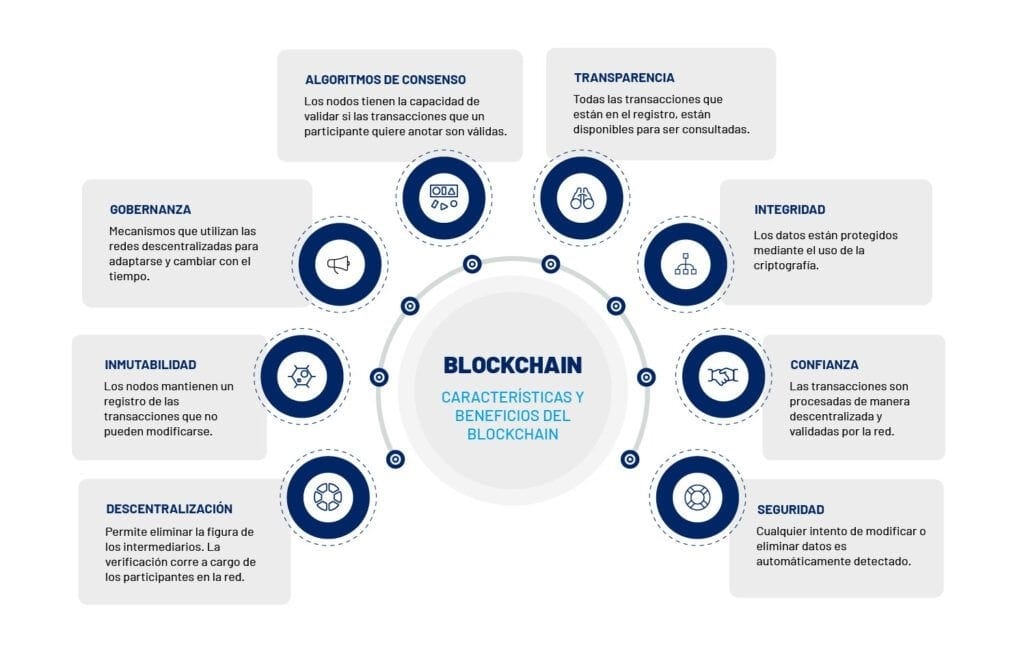By David Madrona Salazar, Ambassador of World Token Congress
✅ In the legal field, digital transformation manifests itself in almost all its aspects, both in the public and private spheres, and involves completely restructuring an organisation in order to adapt it comprehensively to the functioning of today's world. This requires taking advantage of the opportunities offered by technology, features and new organisational systems.
It is the confluence of several technologies that make digital transformation possible. These include #Bigdata, #Smartdata, #IA and, of course, #Blockchain. And if there is a technology that induces and produces a digital transformation, it is the latter. This is determined by the depth of the technological, economic, regulatory and social changes brought about by both #Blockchain and #DLT.
As a result of the innovative achievement of distributed ledger technology in terms of communication, decentralising and distributing the assets and data processed or the exercise of the basic functions for legal traffic, it is the basis on which the foundations of the well-known #web3 are built.
#Blockchain is a communication protocol that proposes a paradigm shift in terms of data custody or storage, transmission, location, tracking or tracing and retrieval, and compliance or control of different types of legal business, based on automated execution mechanisms, known as #Smartcontracts.
Therefore, #Blockchain has a cross-cutting impact on different areas of law, ranging from data protection, e-commerce, financial and corporate regulation, among others, including any regulated sectoral area that may be subject to traffic through a distributed database. It is worth remembering that #smartcontracts can be used to create so-called #Tokens through which a digital representation of an asset, whether digital or physical, can be created.
In the event that the asset is subject to specific regulation, such as a financial asset, the #smartcontract itself should be programmed to comply with the regulation and with the contracts associated with it. It must also follow the guidelines indicated by the supervisory body, in terms of the issuance of financial assets for example, which in the case of Spain would be the CNMV.
This becomes even more complex when trusted third parties or Oracles enter the operation. It should also be borne in mind that many projects launched on #Blockchain combine several disciplines at the same time, with financial, electronic signature and data protection being the ones that have generated most debate to date.
Having said this, it is time to identify what technology can bring to the legal sector by mentioning some of its functionalities as a "Legal tech" tool, and at the same time to identify some of the professional profiles that require specialisation and knowledge of it.
Far from thinking that this technology can replace the work of lawyers or jurists, #Legaltech or initiatives that unite technology and law will further boost legal services, which will be able to democratise access to legal services by increasing the volume of clients in a personalised and scalable way, speed up thousands of procedures, digitally seal contracts guaranteeing their privacy or send certified emails, among some of its applications.
In order to achieve a good development of #blockchain applications at the service of law firms, it is important that lawyers or firms work hand in hand with the developers and engineers of this technology. It is also important for the sector to have a good understanding of concepts such as #machinelearning, #deeplearning or #blockchain, because it will soon become part of the legal future.
In a sector as traditional as the legal profession, it is vital to educate and familiarise oneself with all of this, and to embrace technology as a means by which to simplify, streamline and scale the services that firms provide to their clients. The case of #blockchain is of particular interest to the legal field, as it can be used to replace anything that requires authentication or signing. It also has many other applications, and here are some examples:
✍🏻 Management of intellectual property rights and trade secrets.
✍🏻 Control of intercompany agreements.
✍🏻 Implementation of Smart Contracts.
✍🏻 Tokenisation of legal services.
✍🏻 Certified Mail.
✍🏻 Remote e-voting services.
✅ #Blockchain technology will greatly benefit all parties involved in legal services. It can simplify most traditional processes and be highly cost- and time-efficient. With a decentralised framework, transparency in legal proceedings will be greatly improved.
On the other hand, and apart from what technology itself can bring as added value to the legal sector as a technological tool, it also requires a specific profile of specialised lawyer, which is increasingly sought after, and which the market is demanding with a growing trend:
✍🏻 Compliance Officer.
✍🏻 Corporate & M&A.
✍🏻 Tax Manager Blockchain.
✍🏻 Corporate & Securities Council.
In conclusion, the legal team must form the fundamental basis for a migration of the business model to a tokenised service, with full guarantees of execution and verification of the processes. In the event to be held in Madrid you will have all the information from the hand of an unprecedented legal team, available and with guarantees of success.

